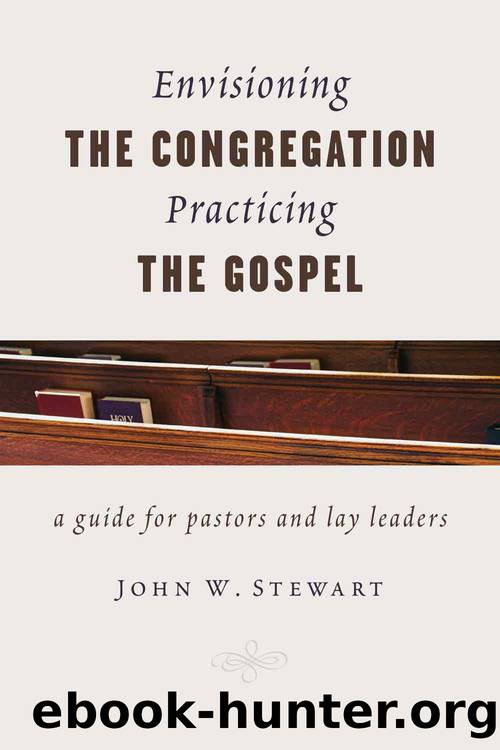Envisioning the Congregation, Practicing the Gospel by Stewart John W.;

Author:Stewart, John W.;
Language: eng
Format: epub
Publisher: Wm. B. Eerdmans Publishing Co.
Published: 2015-04-14T19:46:46+00:00
17. While not an easy read, John Swinton and Harriet Mowat have assembled an excellent manual about the purposes and methods of qualitative research for use in congregations. See their Practical Theology and Qualitative Research (2006, esp. chapters 1-3).
Chapter 7
Practicing the Arts of Witnessing:
Testimony and Advocacy
Martyria
âYou will receive power when the Holy Spirit has come upon you; and you will be my witnesses in Jerusalem, in all Judea and Samaria, and to the ends of the earth.â
â Acts 1:8
And day by day the Lord added to their number those who were being saved.
â Acts 2:47
The Greek word martyria in the New Testament is usually translated âwitness.â The English word âmartyrâ derives from it. Scholars note that the etymological root of martyria is similar to âpointing.â Sometimes martyria carries the more expansive concept of âwitnessâ as a creed or faith summary.
The novelist and essayist Frederick Buechner, in Telling Secrets, describes an incident when he was a visiting lecturer at Wheaton College, near Chicago. While discussing such mundane topics as weather and movies over lunch with two students, one of them asked the other, as naturally as he would ask the time of day, what God was doing in his life. âIn the part of the East where I live, if anybody were to ask a question like that, even among religious people, the sky would fall, the walls would cave in, the grass would wither,â Buechner said. âI think the very air would stop my mouth if I opened it to speak such words among just about any group I can think of in the East because their faith itself, if they happen to have any, is one of the secrets that they have kept so long that it might almost as well not existâ (Buechner 1991, 82).
Buechnerâs discomfort is not without some foundation. For some, the word âwitnessingâ carries baggage akin to unwelcomed confrontations. On a larger scale, any person with a history-Âinformed memory acknowledges that Christian witnessing in the name of God often escalated into ugly coercion and unspeakable violence against Jews, Muslims, Native Americans, and Mormons, to name only a few. The founders of the American republic viewed the wars of religion in Europe with disgust and noted that aggressive religious commitments bred violence and alienation in the body politic. To counter such threats, an ethic of toleration was written into the Constitution and the Bill of Rights, policies that disestablished and de-Âprivileged one religious community over all others.
Buechnerâs discomfort may also be grounded in the swelling diversity of religious commitments in contemporary North American society outlined earlier (ch. 2). Pluralism as an ideology has refined the meaning of religious âpolitical correctnessâ in public arenas.
For many postmoderns, religious preferences, like oneâs personal financial and political affairs, are strictly private and best kept closeted. âDonât ask; donât tellâ is the mantra. I am reminded of a cartoon in The New Yorker by W. Miller in which the three proverbial monkeys are lined up in a row.
Download
This site does not store any files on its server. We only index and link to content provided by other sites. Please contact the content providers to delete copyright contents if any and email us, we'll remove relevant links or contents immediately.
| Church Administration | Church Growth |
| Church History | Church Institutions & Organizations |
| Church Leadership | Church Materials |
| Clergy | Ecclesiology |
| Ministry to the Sick & Bereaved | Pastoral Resources |
Fangirl by Rainbow Rowell(9220)
How to Bang a Billionaire by Alexis Hall(8133)
Wonder by R. J. Palacio(8095)
The Thirst by Nesbo Jo(6921)
The Space Between by Michelle L. Teichman(6921)
Assassin’s Fate by Robin Hobb(6192)
Wiseguy by Nicholas Pileggi(5762)
The Night Circus by Erin Morgenstern(5210)
Paper Towns by Green John(5173)
The Kite Runner by Khaled Hosseini(5159)
Bittersweet (True North #1) by Sarina Bowen(4840)
Gerald's Game by Stephen King(4631)
Too Much and Not the Mood by Durga Chew-Bose(4328)
Pillow Thoughts by Courtney Peppernell(4268)
Goodbye Paradise(3795)
Twelve Days of Christmas by Debbie Macomber(3549)
Good by S. Walden(3543)
The Rosie Effect by Graeme Simsion(3454)
The Cellar by Natasha Preston(3328)
